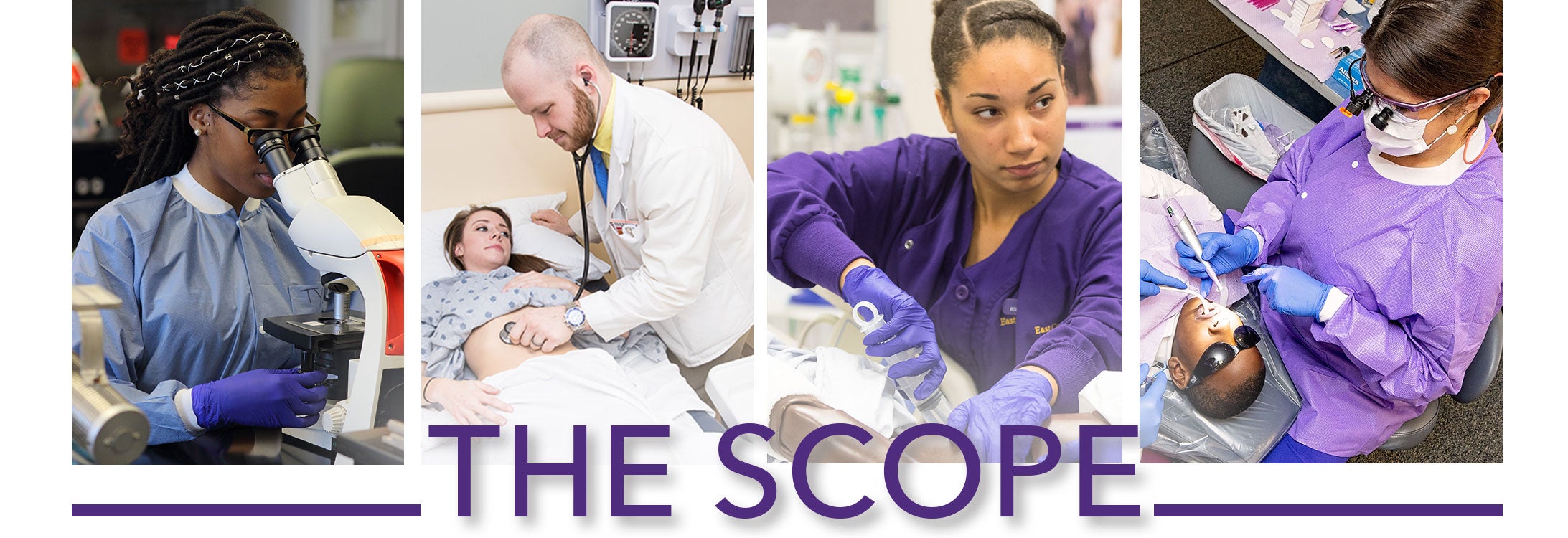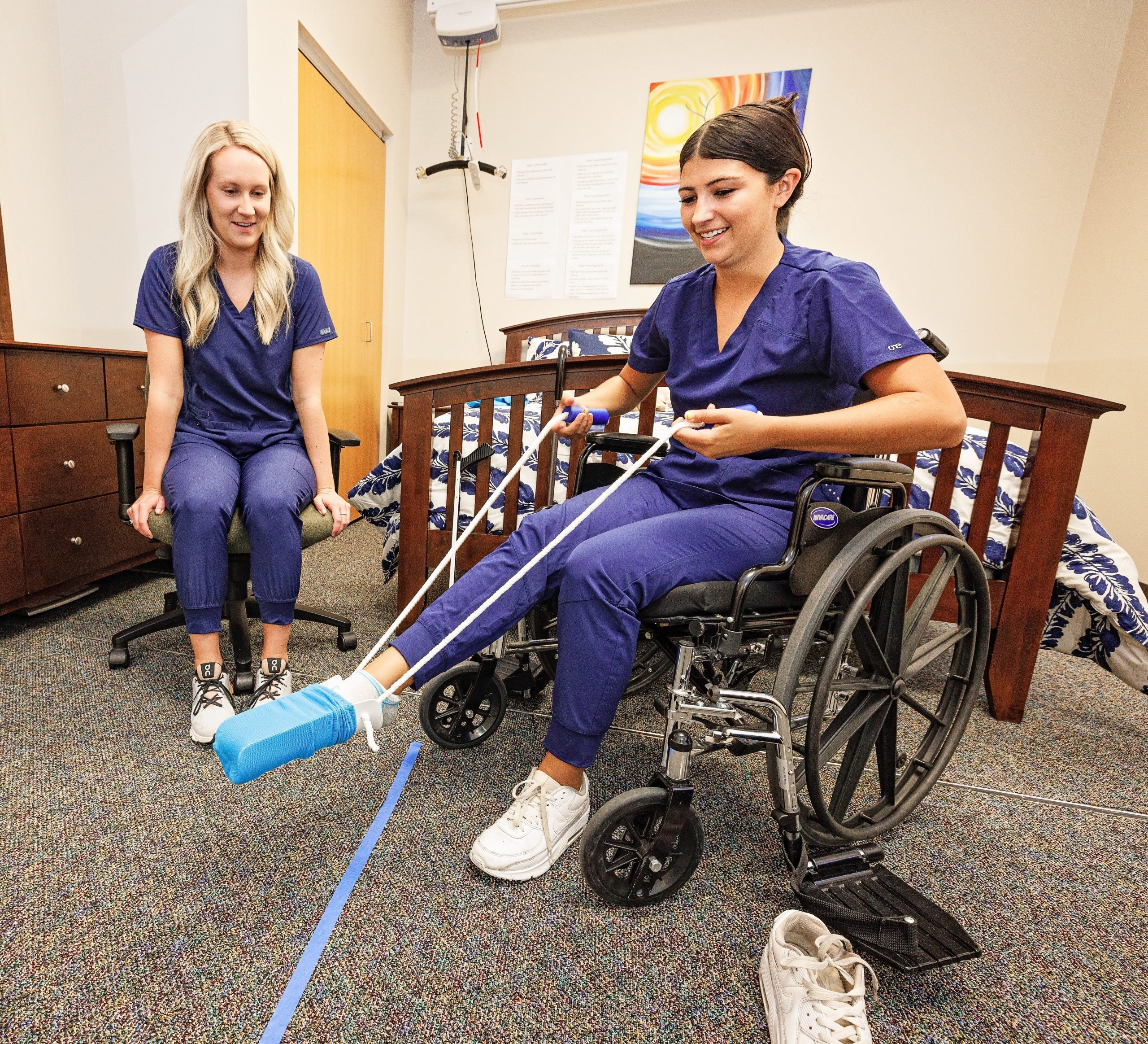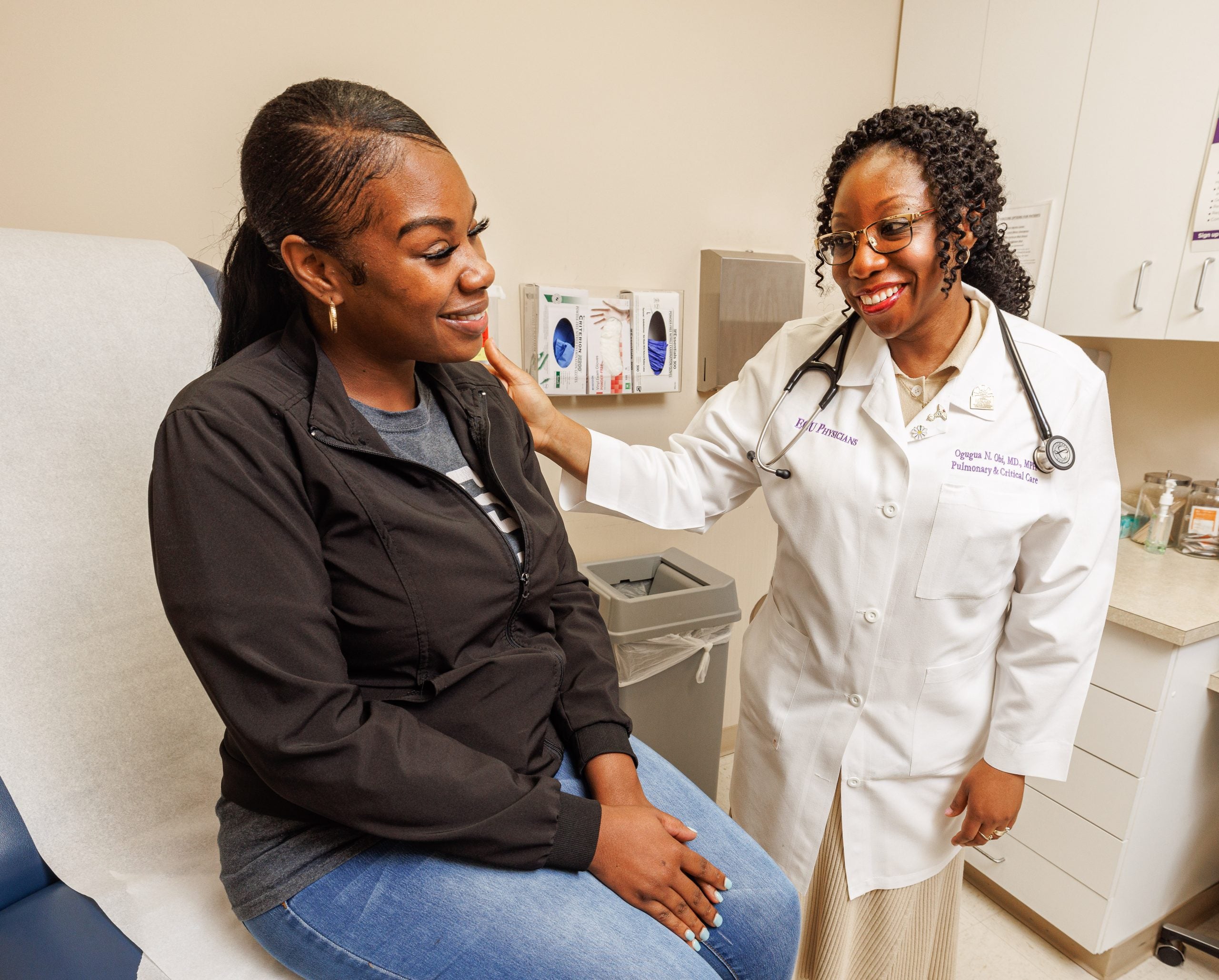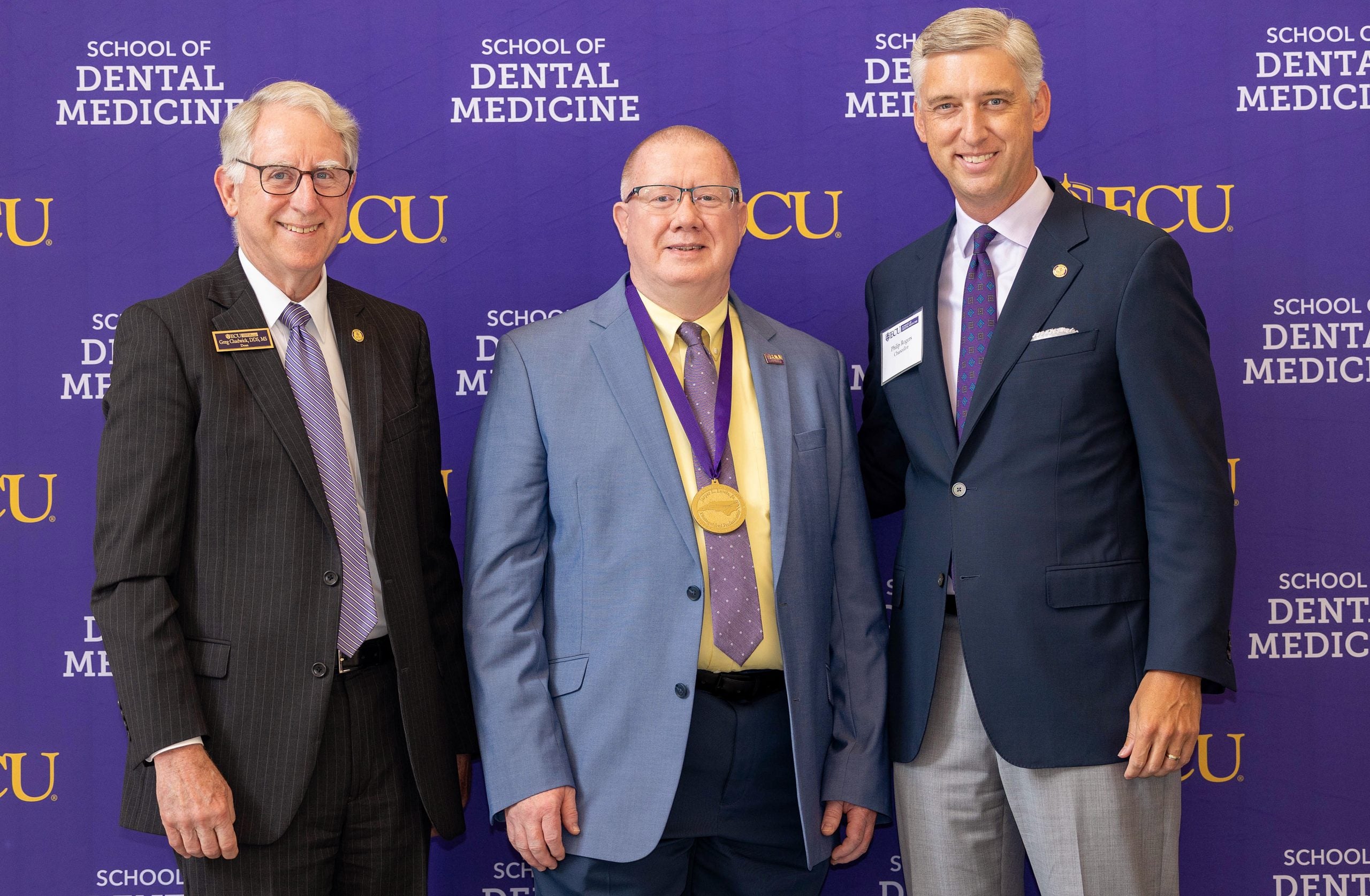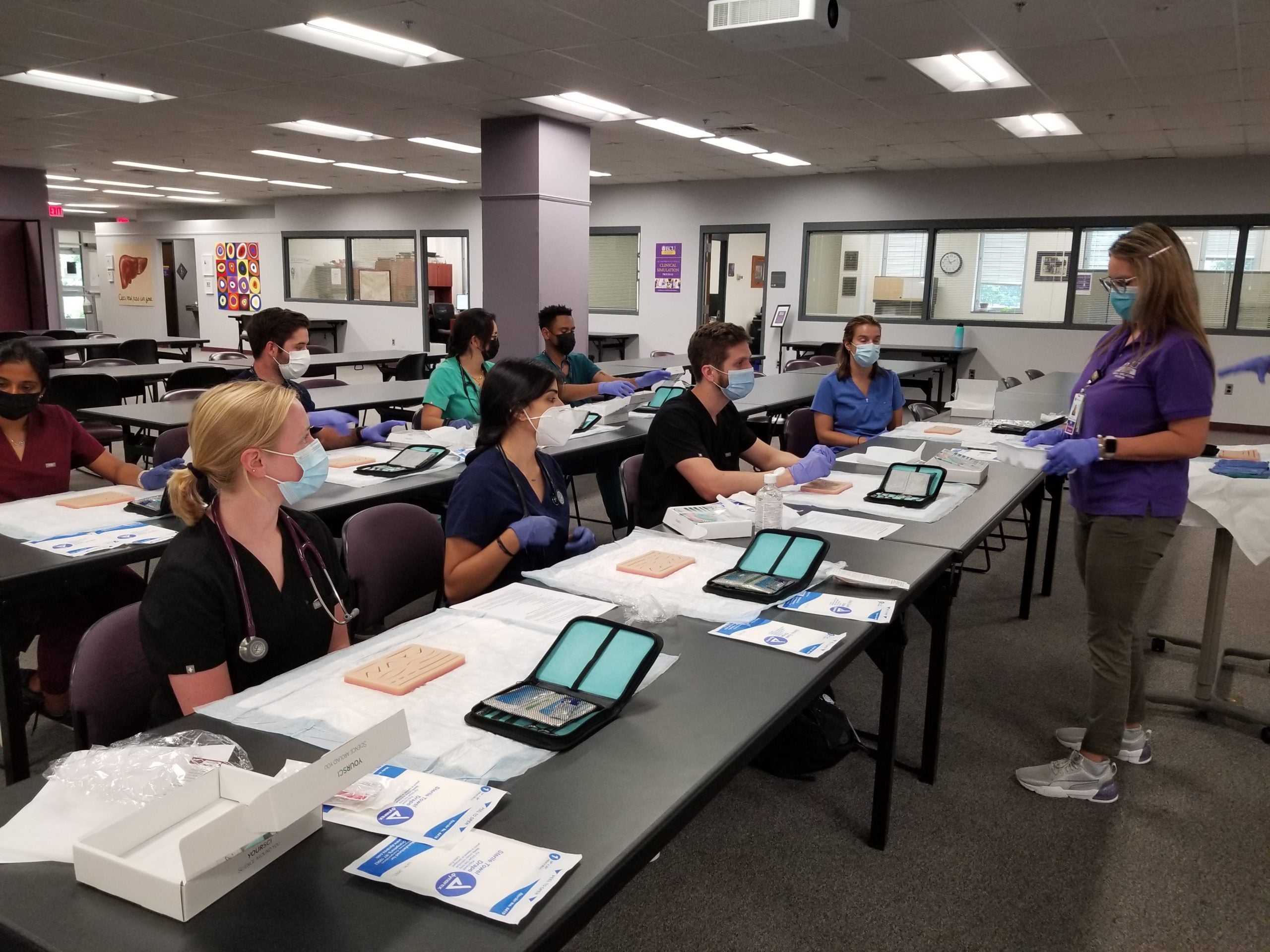August 2022
Welcome to the August issue of “The Scope,” the newsletter of the ECU’s Health Sciences.
Dear Colleagues,
I officially started as the dean of the College of Nursing on July 1, and these first few weeks in my new role have been incredible. I have had time to meet with the faculty and staff here in the College of Nursing and I have been blown away by their depth of knowledge and commitment to developing the next generations of nurses who will have hands-on and heart-to-heart impacts on lives here in North Carolina and beyond. I am humbled to be counted among their ranks.
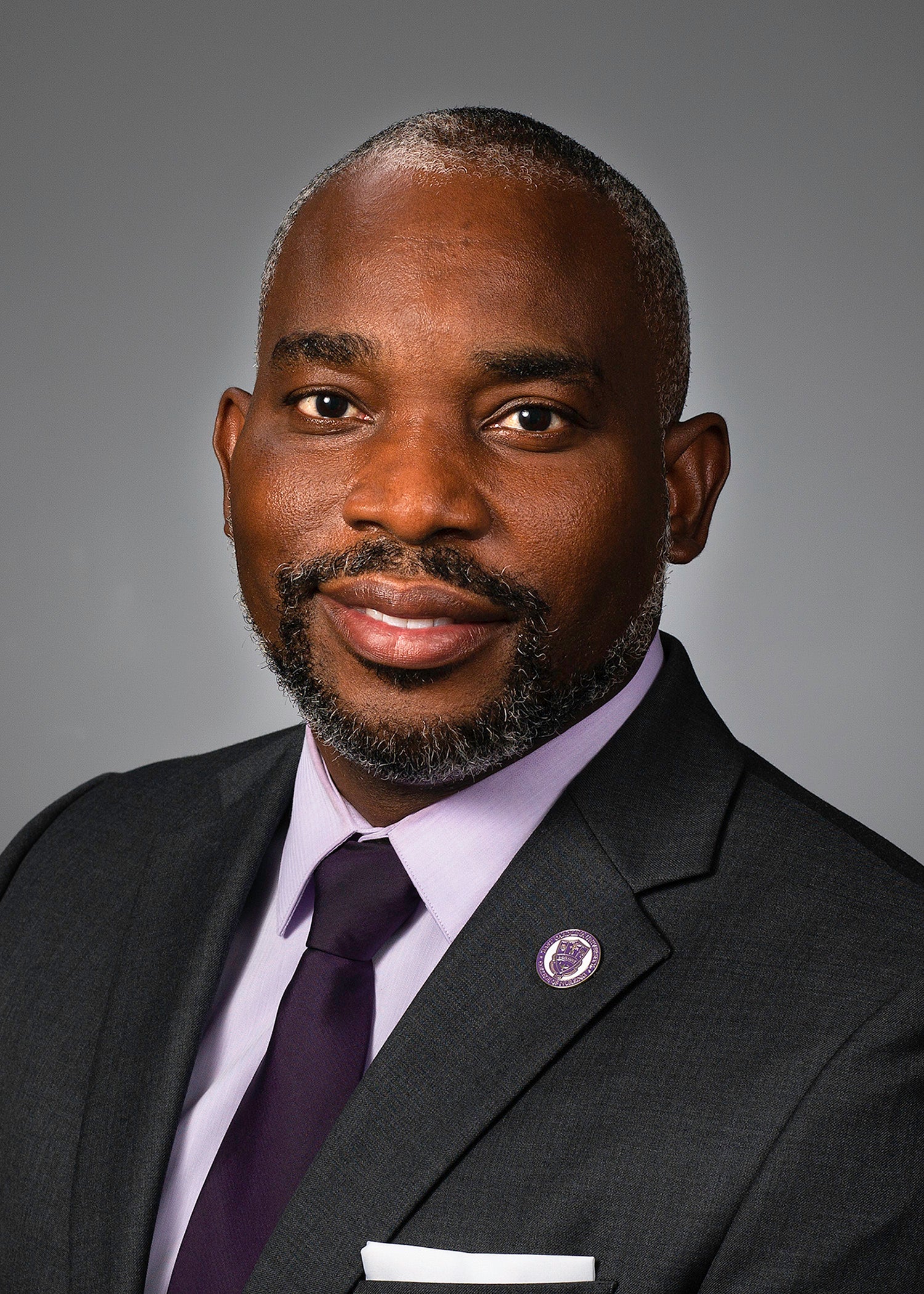
Dr. Bim Akintade Dean, College of Nursing
The University of Maryland had been my home for nearly 20 years and I will always treasure my time as a member of the faculty there. I will be honest, when I interviewed for this position, I really did not know much about ECU or its College of Nursing, but as soon as I stepped on to the campus I knew that this is a special place and that I want to be part of the future of Pirate Nursing. ECU is a national leader in nursing education and the transformation of healthcare in rural and underserved communities. My oath is to ensure that the College of Nursing will continue to be a leading example of nursing education excellence. I am proud to make ECU and Greenville my home.
With guidance from the Chancellor and Provost, and the institutional wisdom of the College’s faculty and staff, I’ve started to chart our path forward. Our first priority should be to double down on the incredible work that is being done right now. We graduate the most nursing students of any North Carolina school, our distance education program is lauded every year, our midwifery program is among the best in the nation and the National League of Nursing has again designated us as a Center of Excellence.
The College is strong, but we cannot lose sight of the opportunities that await us. We need to further invest in our RN to BSN program to help stem the tide of nursing shortages, particularly in rural communities. I also believe that for the College to flourish we need to deepen our connection with Pirate Nurse Nation and help to strengthen the connections between our alumni communities here in eastern North Carolina and across the country. Our strength is bound up in the bonds that we share. I believe that having a network of like-minded nurses to celebrate successes with, and lean on in tough times, is one of the ways we can improve nurse retention.
Diversity and inclusion must be part of everything we do. We must recruit students from across all segments of society and return those students to their homes to carry on the tradition of Pirate Nurses innovating care for rural and underserved populations. The research is clear – when nurses look and sound like their patients, the healthcare outcomes are greatly improved. Including everyone helps everyone.
Mostly, I want to extend my gratitude to the leadership of ECU for their trust in me and the faculty and staff of the College of Nursing for their warm welcome and willingness to accept a new face as one of their own. I am excited for what the future holds and I cannot wait to meet our students as they pass through the halls of the College of Nursing in the coming semester.
As I take the helm, I am grateful for the legacy that Dr. Sylvia Brown left as she retired. Four decades of distinguished service, culminating as the College of Nursing dean, has ensured that the organization that I now lead is on unshakable footing and well prepared to meet the challenges and opportunities of training the next generation of nursing leaders.
Bim Akintade, PhD, MBA, MHA, ANCP-BC, NEA-BC, FAANP
Dean and Professor, East Carolina University College of Nursing
Education
Recent campus initiatives are focusing on tradition, innovation and accessibility across educational programs.
The Brody School of Medicine officially welcomed 86 new medical students — all North Carolina residents — during its annual White Coat Ceremony in July.
In front of a standing-room only crowd of cheering family, friends and faculty members, the first-year medical students were individually presented with the white coats they will wear in patient care areas throughout their time at ECU.
Keynote speaker Dr. Aundrea Oliver, an assistant professor of thoracic and foregut surgery in Brody’s Department of Cardiovascular Sciences, spoke about the significance of the white coat.
“The most important thing to remember through this is that this is not about you,” Oliver said. “If you become an oncologist, or an epidemiologist or if you go into pediatrics, it doesn’t matter where your patient needs you or their families or the community. It’s about making change everywhere they are.
“The mark of a true physician is someone who can look into the face of uncertainty and say, ‘I don’t know, but I do know we are determined to find out,’” she added. “It’s someone who can look at a patient who is suffering and seek the truth to confront it wholeheartedly and not run away when someone else is in pain. All of us are achievers. All of us would like to be successful. But I will tell you that the best way to do that is to always put your patient — who is right in front of you — as your focus.”
The College of Allied Health Sciences is set to offer a doctoral degree program in occupational therapy — the first at any public university in the state.
“As a comprehensive college of allied health professions, we are delighted to provide the only Doctor of Occupational Therapy program at a public university in North Carolina,” said Dr. Robert Orlikoff, dean of the College of Allied Health Sciences. “Occupational therapy is a diverse field that enables those with disabilities to engage in the activities of daily living, which improves quality of life in so many ways. This doctoral program will allow us to not only provide our OT students with a greater depth of knowledge and an expanded skillset, but to prepare the next generation of leaders in this important discipline.”
ECU currently offers a master’s degree in occupational therapy; the entry-level doctoral degree will add another option for students pursuing graduate work in the discipline. Both programs will include the intensive hands-on clinical experience that is a hallmark of ECU’s occupational therapy instruction.
Students who enter ECU’s fall 2023 occupational therapy program will be the first cohort to have the opportunity to apply for the OTD program. Applications to the programs are being accepted through Oct. 15, 2022.
“Our OTD program is unique in several ways. First and foremost, students admitted to the program will gain knowledge of occupational therapy before the necessity of deciding whether they want to pursue a master’s degree or a doctoral degree,” said Dr. Denise Donica, professor and chair of the Department of Occupational Therapy. “Our unique design gives students the opportunity to make that decision once admitted into the program instead of before. Their choice will be validated by a year of experience in the program and regular interactions with supportive faculty members who will assist students in determining which program aligns with their professional and personal goals.”
High school students from North Carolina’s largest state-recognized Indian tribe — and who have particular interest in science, technology, engineering and math fields — visited East Carolina University’s Health Sciences Campus on July 13 to get a first-hand look at what life as a Pirate health sciences major might look like.
The STEM-focused students visited a cluster of post-secondary schools in eastern North Carolina — stopping at Methodist and Campbell universities — before spending an entire day on ECU’s Health Sciences Campus. They toured ECU’s Brody School of Medicine, Health Sciences Student Center, College of Nursing, School of Dental Medicine and met with the ECU directors of the North Carolina Agromedicine Institute.
The tour was organized by Project 3C (Community, College and Career), a collaboration between the Lumbee Tribe of North Carolina, Public Schools of Robeson County, Robeson Community College, and the University of North Carolina at Pembroke. Grant funding for the project was provided by the Native Youth Community Project which is administered by the U.S. Department of Education.
The Lumbee Tribe’s 55,000 members live primarily in the southern North Carolina counties of Cumberland, Hoke, Robeson and Scotland.
“These community projects are geared towards poverty-stricken areas — low income, very rural — which is what Robeson County is. We actually serve the four counties for the Lumbee Tribe service area, and I think we’ve got representatives for at least each county,” said Samantha Brayboy, Project 3C’s director and a member of the Lumbee Tribe. “Hopefully we can increase the number of American Indians that are represented in STEM overall, because our total population for the entire nation, is under one percent.”
Visit YouTube to watch this video in closed-captioning
Patient Care
Students, faculty and providers are addressing health challenges facing patients in the East.
An ECU clinic is gaining international recognition for its efforts to tackle a bedeviling systemic inflammatory disease that affects an unusually high number of people in eastern North Carolina.
Sarcoidosis is an inflammatory disease that causes granulomas, or clumps of immune cells, to develop in any organ in the body, though the lungs, skin and eyes are mostly commonly affected. The cause of sarcoidosis is unknown but there are indications that external conditions like allergens, bacteria, viruses and other exposures may trigger disease in genetically predisposed individuals.
Less than 200,000 people in the U.S. have sarcoidosis, making it relatively rare. But there is an abnormally high incidence and prevalence of sarcoidosis in eastern North Carolina.
“The disease predominantly affects African American women and tends to be more severe in patients of lower socioeconomic status,” said Dr. Ogugua Ndili Obi, a pulmonary and critical care physician and assistant professor at ECU’s Brody School of Medicine, who serves as the director of the Sarcoidosis Center at ECU.
Sarcoidosis is not usually fatal, with a mortality rate of about five percent, but North Carolina is in the top five states where patients die of the disease.
Recent work by a group of ECU researchers revealed that sarcoidosis mortality in eastern North Carolina is well above national statistics and that eastern North Carolina has the highest death rates of those diagnosed in the state. Black North Carolinians have five times the mortality rate than the general population of sarcoidosis patients, and Black women in the region are 12-13 times more likely to die as a result of the disease than their white counterparts.
“We do think that it has to do with a gene-environment interaction,” Obi said. “So, patients who have some genetic predispositions are exposed to certain things in the environment: rural-living exposures, farming, animal breeding, metalworking and smoke exposures.”
As part of a grant-funded effort to address the lack of health information for migrant farmworkers and their families, staff in Laupus Health Sciences Library at East Carolina University are helping to expand and transform resources into accessible content for this eastern North Carolina population.
In 2019, ECU earned a three-year, $427,551 health disparities grant from the National Library of Medicine (NLM) to help ECU and its collaborators — including Laupus Library, North Carolina State University’s Extension Toxicology program and the nonprofit group Student Action with Farmworkers (SAF) — get critical health and safety information and equipment into farmworkers’ hands.
The latest efforts build on what began in 2017 as a pilot grant. The project, led by College of Health and Human Performance faculty member Dr. Joseph Lee and ECU’s Academic Library Services team, secured a $15,000 grant from the National Network of Libraries of Medicine. The project also includes support from the Department of Health Education and Promotion and SAF.
The collaboration provided internet access and information literacy training for middle and high school students from migrant and seasonal farmworker families.
The latest efforts took Jamie Bloss, a Laupus liaison librarian, on the road to Wake Forest University in search of patient education materials specifically targeted at addressing farmworker health and safety topics.
North Carolina ranks sixth nationally in the employment of migrant farmworkers, with approximately 150,000 migrant and seasonal farmworkers and their families living in the state each growing season.
Research
Faculty and student research projects are opening the doors to discovery in many areas of exploration.
A team of scientists, led by researchers from East Carolina University’s Brody School of Medicine, have identified another problem stemming from COVID-19 infections — the potential for greater risk of Parkinson’s disease.
The ECU contingent of researchers — Dr. Jeffrey Eells, Dr. Shaw Akula, Dr. Srinivas Sriramula and Dr. Dorcas O’Rourke — were joined by Dr. Rich Smeyne from Thomas Jefferson University and Dr. Pete Schmidt from New York University in a study of how COVID-19 infections could increase the likelihood of developing Parkinson’s disease.
Eells and his team secured a portion of the CARES Act funding ECU received from the North Carolina General Assembly in 2020 and began work in February 2021 with the study results accumulating into the final paper in the fall of 2021.
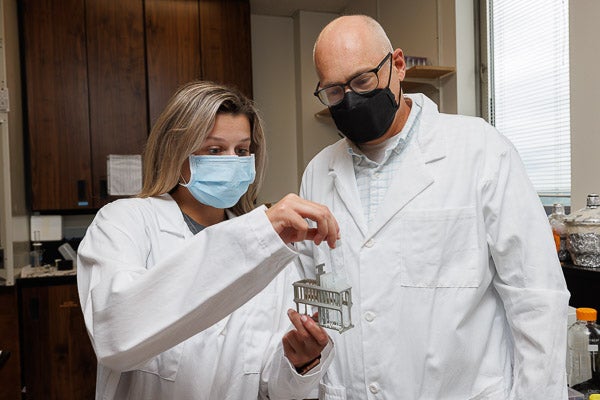
Dr. Jeffrey Eells, associate professor of anatomy and cell biology, Brody School of Medicine Kristen Armel (Raleigh) second year medical student, Brody School of Medicine(ECU Photo by Cliff Hollis)
Through studying pre-clinical models that had recovered from COVID-19 exposure, the research team determined that the subjects were more sensitive to the effects of a Parkinson’s Disease-inducing toxin. The models that showed Parkinson’s-like brain disruption were infected with COVID-19, but did not get noticeably ill, much in the way that most humans infected with COVID-19 may have felt sick but did not need to be hospitalized.
“I think this model represents people that are more susceptible to the virus infections. The subjects that we used got infected, because they have antibodies to the virus, but they weren’t really sick,” said Eells, an associate professor of anatomy and cell biology at Brody.
Medical and dental students in the Summer Scholars Research and distinction track programs showcased their scholarly work on Aug. 1 during the 25th Annual Medical Student Scholarship Forum at the East Carolina Heart Institute at ECU.
The forum, hosted by the ECU Brody School of Medicine’s Office of Medical Education, gave students an opportunity to present their work and posters to colleagues and guests.
The Brody School of Medicine offers four distinction track programs related to the core missions of the school: health system transformation and leadership, research, medical education and teaching, and service-learning. The programs began in 2015 to provide students the opportunity to independently pursue an area of interest that reflects the core values that led them to select a medical career. Since then, 229 students have been accepted into the distinction track programs and 152 students have completed all program requirements to graduate with distinction.
Second-year medical student Felicia Branch presented her project on chronic pain and identifying biomarkers that can be used to predict individual opioid responsiveness, potentially reducing and preventing the potential for opioid addiction in the long run.
“This topic of chronic neuropathic pain resonates with me as many members of my family and community struggle with pain management,” Branch said. “The opportunity to be a part of an initiative exploring therapies to better treat chronic neuropathic pain as well as reducing the potential for opioid exposure and addiction aligns with some of my personal goals as a future physician.”
Two researchers at East Carolina University’s Brody School of Medicine have been selected as the 2022 recipients of the Wooten Family Initiative for Brain Health Research Grant.
Dr. Alessandro Didonna, an assistant professor in the Department of Anatomy and Cell Biology, and Dr. Tonya Zeczycki, an assistant professor in the Department of Biochemistry and Molecular Biology, were selected by the advisory board for the initiative in May.
Didonna was awarded for his research on “Exploring the Role of Centaurin Alpha-1 in Multiple Sclerosis (MS).” Multiple sclerosis is an autoimmune disease of the nervous system characterized by an acute inflammatory phase which is followed by progressive neurodegeneration. He explained that while there is an arsenal of treatments to control the initial inflammatory bursts, the current ability to tackle the neurodegenerative stages of MS is very limited due to limited knowledge of the molecular mechanisms’ underlying disease conversion.
The study will test the novel hypothesis that a protein known as Centaurin A1 regulates the vulnerability of neurons against neuroinflammation, which could have implications for other diseases.
Zeczycki was awarded for her research on “Preventing the Formation of Toxic Alpha-Synuclein Oligomers: An Alternative Therapeutic Strategy for Slowing the Onset of Parkinson’s Disease.”
The Wooten Family Initiative for Brain Health Research, previously known as the Wooten Lab for Alzheimer’s and Neurodegenerative Diseases Research, was established in 2008 by Dr. Harriet Wooten in memory of her husband, Dr. John L. Wooten, an orthopedic surgeon who died of Alzheimer’s disease in 2004. While previous projects focused narrowly on Alzheimer’s, current and future grants will focus on brain health more broadly.
“Initiatives like the ones provided by the Wooten family help the community by affording us the means to do these collaborative research studies with collaborative research teams that have a direct impact on both ECU and its communities,” Zeczycki said. “Graduate students working on getting their Ph.D. and M.S. degrees, medical students on the research distinction tracks, and undergraduates looking for research experience in our labs — many of them who are underrepresented minorities, first generation college students or women — are working side by side with our skilled scientific staff and driving the research forward with us.”
Honors and Accolades
Representatives of the Health Sciences Campus have earned local, state and national honors for their talents, endeavors and service.
Dr. Michael Waldrum, dean of East Carolina University’s Brody School of Medicine and chief executive officer of ECU Health, has been named to the board of directors of the Association of American Medical Colleges (AAMC).
Waldrum joins 18 other medical school and health care leaders from across the nation and Canada named to the board, including representatives from Yale School of Medicine, Georgetown’s School of Medicine and Harvard Medical School.
“It is an honor to be named to the AAMC Board and to work with my colleagues in academic organizations across the national landscape to chart a healthier future for our communities and region,” Waldrum said. “Academic health care drives innovation, produces clinical excellence, and creates a teaching environment that helps train the providers of tomorrow. I look forward to continuing to collaborate alongside national leaders and focusing on how we can best support our students, faculty and academic rural health care.”
The AAMC leads and serves America’s medical schools and teaching hospitals and individuals employed across academic medicine, including more than 191,000 full-time faculty members, 95,000 medical students, 149,000 resident physicians, and 60,000 graduate students and postdoctoral researchers in the biomedical sciences.
Dr. Bim Akintade, the new dean of East Carolina University’s College of Nursing, will be inducted as a fellow in the American Academy of Nursing, recognized by the nursing community as the highest honor that a nurse can receive from their peers.
“This designation is the highest honor one can receive in the nursing profession, and I am happy I will be inducted in purple and gold to represent Pirate Nurse Nation,” Akintade said.
Akintade will join 250 other nurses from across the nation and 17 foreign countries to be formally inducted into the 2022 class of fellows during a ceremony in Washington, D.C., in October. The new inductees will join more than 3,000 other nursing professionals as AAN fellows who serve as experts in nursing research, practice and education.
Akintade comes to ECU after beginning his academic career as a faculty member and administrator at the University of Maryland. While at Maryland, he served as the director of the Adult Gerontology Acute Care Nurse Practitioner/Clinical Nurse Specialist Doctor of Nursing Practice program prior to being appointed associate dean of the Master of Science in Nursing Program.
Four distinguished Pirate nurses have reaffirmed their commitment, through generous scholarship endowments, to ensure that underrepresented nursing candidates from across eastern North Carolina get the education and training they need to positively impact rural and minority community heathcare.
The scholarships, endowed by black women who have reached the highest levels of health care delivery and administration, help the East Carolina University College of Nursing fulfill its mission to serve as a national model for transforming the health of rural underserved regions.
The Lillie Rose Scholarship was established in 2021 by Dr. Sharona Johnson (’05, ’17) and Dr. Daphne Brewington (’90, ’98, ’13) in memory of their mothers, Rose Marie Gay-Griffin and Lillie Mann Holloway. The scholarship supports underrepresented graduate nursing students from North Carolina’s eastern counties who have faced hardships and barriers to pursuing their dream to be a nurse.
Dr. Mary Chatman (’90, ’96, ’12) established an undergraduate scholarship in memory of her mother, Grace. The Grace Scholarship — four awards of $5,000 each — is based on the financial need of students representing historically underrepresented populations with first preference going to students from Hyde, Beaufort, Tyrell, Washington or Bertie counties. Second preference is to students from Edgecombe, Halifax, Hertford or Northampton counties.
Sandra George Robinson (’92) was the first ECU nursing student deployed to war. While being deployed to war wasn’t something she anticipated, the experience proved rewarding, leaving her with a profound sense of commitment and discipline. The Combat Female Veterans Families United Scholarship she established will provide academic support for future nursing students.
East Carolina University College of Allied Health Sciences students studying speech-language pathology and audiology who comprise the East Carolina chapter of the National Student Speech Language Hearing Association (NSSLHA) have been awarded gold honors for 2022 for their community outreach activities and volunteerism.
ECU’s chapter — which retained gold honors for a fifth-consecutive year — is one of only two from North Carolina to be awarded the honor this year.
The NSSLHA is the national organization for students studying communication sciences and disorders. The association is also affiliated with the American Speech-Language-Hearing Association, which serves as the nation’s professional organization for audiologists, speech-language pathologists, speech, language and hearing scientists, and students of these disciplines
“We have a lot of undergrads in the organization and well and they are all very passionate because at ECU you have to be accepted into the undergrad program and then also into the graduate program, if you choose to do that,” a graduate student and the president of ECU’s NSSLHA chapter. “As a whole, the organization — every single person is very passionate about the field.”
Dr. Michael Webb was named the inaugural recipient of the East Carolina University School of Dental Medicine’s Jasper L. Lewis, Jr. Distinguished Professorship in Pediatric Dentistry during a July 21 ceremony at the East Carolina Heart Institute. The professorship is the school’s first endowed professorship and is supported by gifts through the ECU Medical & Health Sciences Foundation, Inc. The award was named in honor of Jasper Lewis, Jr., a longtime Greenville pediatric dentist, national trailblazer and advocate in the dental profession.
Webb is a clinical associate professor and chair of the school’s Department of Pediatric Dentistry, Orthodontics and Dentofacial Orthopedics.
The school received $667,000 in gifts toward the establishment of the distinguished professorship, which was supplemented by the state with an additional $333,000, bringing the endowed distinguished professorship to $1 million. More than $300,000 in additional pledges and commitments will provide an endowment for the Lewis Collaborative, a year-long program through the professorship that will offer rigorous classroom and clinical experiences to general dentists working to become highly trained in caring for pediatric dental patients.
“This is one of the most exciting firsts,” Chadwick said. “As every milestone we have approached in the life of the School of Dental Medicine, all of our firsts have been made possible through community who believe in us and believe in our mission.”
Philanthropy
A Brody School of Medicine alumnus made a creative donation to current medical students in honor of his own experience.
To honor his educational experience in the Brody School of Medicine and to help prepare current students, Dr. Patrick O’Malley ’04 donated 90 practice suture kits for the M2 class through Brody’s Interprofessional Clinical Simulation Program. O’Malley also granted the students free access to an online course he created, the Laceration Course, a comprehensive 7 lecture series covering all aspects of acute wound management. The course is aimed at students, residents and clinicians in the primary care, urgent care and emergency department setting.
“The suture pads from Dr. O’Malley are used as part of the M2 Doctoring Skills course,” said Becky Gilbird, director of the Interprofessional Clinical Simulation Program. “This course has two in-person sessions led by Dr. Robey and Dr. Rodriguez-Carrion. In the first, students are given the suture pads and instructions how to access the course. Students then have a hands-on demonstration of aseptic technique using the suture pads. Their homework assignment for the second session is to complete modules through TheLacerationCourse.com. When they come back for the second session, students will demonstrate suturing for faculty, who will give one-on-one feedback and evaluate their suturing skills.”
O’Malley is an emergency physician at Newberry County Memorial Hospital in Newberry, S.C. as well as an entrepreneur. In addition to the Laceration Course, he also invented the Lactalite, a rechargeable light that makes breast-pumping easier for nursing mothers.
While at Brody, O’Malley served as the co-coordinator of the Emergency Medicine Interest Group and completed a project on preventive health care in the emergency department as an N.C. Schweitzer Fellow. He received the George Podgorny Award for Dedication to Emergency Medicine.
“I am very grateful for my time at Brody School of Medicine and how it prepared me for my career in emergency medicine. I was always made to feel welcome and encouraged in the ED as a student by both faculty and residents,” O’Malley said. “Getting early hands-on practical skills, such as suturing, allows students to have a more enjoyable and immersive experience during their clinical rotations. I am very excited to partner with BSOM and provide these young learners a practice suture kit and educational content through The Laceration Course.”
To learn more about how you can support students across the ECU Health Sciences, contact the ECU Medical & Health Sciences Foundation.
